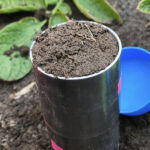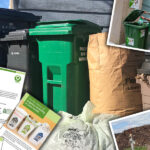Top: Education and training session to learn about using the HomeBiogas digester at the Tongogara Refugee Camp in Zimbabwe.
Refugee camps around the world generate huge quantities of organic waste, which can cause sanitary and environmental problems, as well as be costly to manage. Recently, HomeBiogas, an Israeli company that manufactures small-scale biogas systems, was awarded a contract from the United Nations to install its systems to treat organics at refugee camps in Africa. “In Zimbabwe we have installed nine HBG 7 units, which can contain high amounts of waste, and generate six to seven hours of cooking fuel every day,” explains a HomeBiogas spokesperson. “Two systems were installed in the UN’s main office in Harare, and are used by the UN staff as well as refugees who are provided temporary accommodations at this facility before they can go to the refugee camp. The other seven systems were installed at the Tongogara Refugee camp, 285 miles southeast of Harare.” The HBG 7’s digester tank has a volume of 1,136 gallons (4,300 liters); volume of the gas tank is 660 gallons (2,500 liters). It is sized to receive up to 5 gallons/day of kitchen waste and up to 29 gallons/day of animal manure slurry. The unit retails for about $1,570.
The decision regarding the size of the system is very much related to the amount and type of waste the end user has available. For example, at the Tongogara Refugee camp, the systems are servicing two restaurants with large quantities of kitchen scraps, and the gas is used to cook for the customers of the restaurants, according to the company. In addition, five systems have been installed by the camp’s piggery, which produces large quantities of pig waste. This helps improve sanitation at the camp. A communal cooking area has biogas stoves connected to these five systems for the residents of the camp.
The Malawi refugee camp will install smaller systems that are more suitable for households, and will be used for the family’s cooking, replacing their smoky kitchens where charcoal and firewood are used for fuel. At both refugee camps, HomeBiogas will consult on how to optimally use the biofertilizer generated by the systems. Options include planting crops that will be used by the camps’ residents, as well as crops to feed the livestock.














